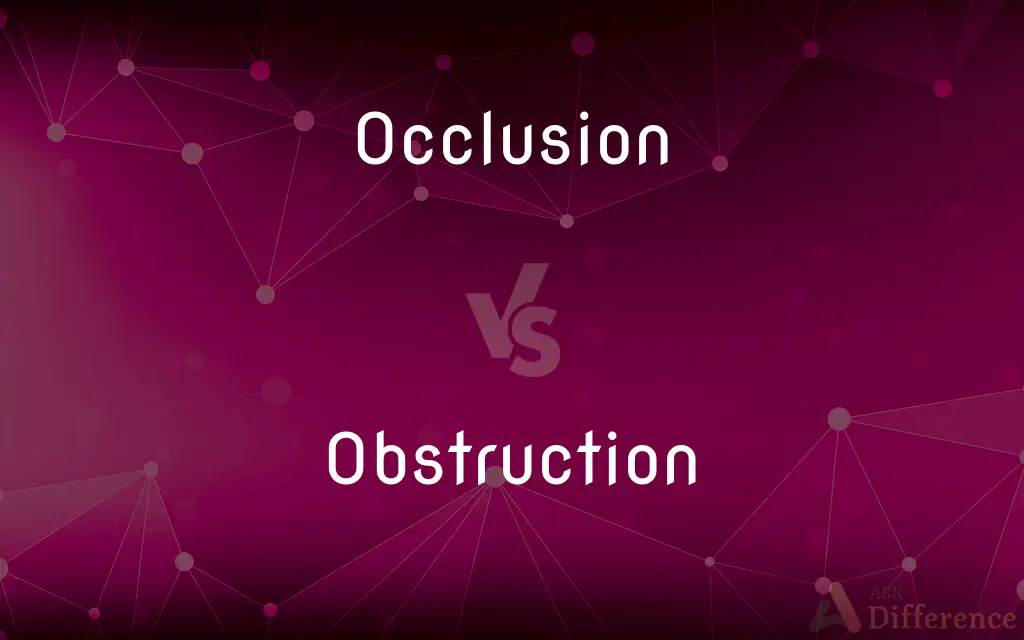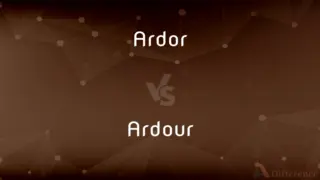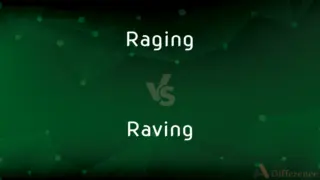Occlusion vs. Obstruction — What's the Difference?
Edited by Tayyaba Rehman — By Maham Liaqat — Updated on March 18, 2024
Occlusion refers to the blockage or closing of a passageway or vessel, often used in medical and dental contexts, whereas obstruction implies an impediment or something that blocks or hinders passage, applicable in various settings.

Difference Between Occlusion and Obstruction
Table of Contents
ADVERTISEMENT
Key Differences
Occlusion often pertains to the blockage in a biological context, such as blood vessels or airways, and can also relate to the alignment of teeth. It highlights a condition where the natural flow or function is impeded internally. Obstruction, on the other hand, generally refers to the act of blocking or the state of being blocked by an external object or factor, affecting various scenarios from physical pathways to abstract processes.
In medicine, an occlusion can lead to serious health issues, such as in the case of arterial occlusion, which disrupts blood flow and can cause tissue damage. In dentistry, occlusion deals with the contact between teeth, critical for proper jaw alignment and function. Obstruction, however, is a broader term and can describe anything from a blocked road due to a fallen tree to a process being hindered by bureaucratic hurdles.
While both terms denote a form of blockage, the specificity and context of occlusion make it more specialized. Obstruction, with its wider application, can be used in physical, legal, procedural, and metaphorical contexts, indicating any barrier that prevents progress or movement.
The implications of an occlusion are typically more precise, requiring specific interventions to address the blockage, such as surgical procedures for vascular occlusions or orthodontic treatment for dental occlusions. Obstructions may require a variety of solutions, from physical removal of the obstructing object to systemic changes to overcome procedural barriers.
Understanding the distinction between occlusion and obstruction is crucial for accurate communication, especially in professional and technical fields, ensuring that discussions about blockages or barriers are clear and context-appropriate.
ADVERTISEMENT
Comparison Chart
Definition
The blockage or closing of a passageway or vessel, often internal and specific to medical or dental contexts
An impediment or something that blocks or hinders passage, can be internal or external and applicable in various settings
Context
Primarily medical and dental
Broad, including physical, legal, procedural, and metaphorical scenarios
Implications
Often requires specific medical or dental interventions
Solutions can vary widely, from physical removal to systemic changes
Examples
Arterial occlusion, dental occlusion
Road blockage, bureaucratic red tape
Focus
Internal blockages affecting flow or function
Any barrier that prevents progress or movement
Compare with Definitions
Occlusion
A condition where a passageway in the body is blocked.
An occlusion in a coronary artery can lead to a heart attack.
Obstruction
Something that blocks or gets in the way of movement or flow.
The fallen tree was an obstruction on the road.
Occlusion
The relationship between the upper and lower teeth when they come into contact.
Proper occlusion is essential for efficient chewing and speaking.
Obstruction
A hindrance in a process or activity.
Bureaucratic obstructions delayed the project's completion.
Occlusion
The process of a vessel or pathway becoming obstructed.
Venous occlusion in the leg can cause swelling and pain.
Obstruction
In sports, impeding an opponent's movement.
The player received a penalty for obstruction.
Occlusion
Used in meteorology to describe a weather front closure.
An occluded front often brings complex weather patterns.
Obstruction
In law, an action that impedes justice or the administration of duties.
Obstruction of justice is a serious offense.
Occlusion
In vision and optics, the blocking of light or an image.
The occlusion of one eye can affect depth perception.
Obstruction
An obstacle that must be overcome to progress.
Finding a solution to the logistical obstruction was crucial for success.
Occlusion
A process by which the cold front of a rotating low-pressure system catches up the warm front, so that the warm air between them is forced upwards off the earth's surface between wedges of cold air.
Obstruction
Something that obstructs; an obstacle
We drove around the obstruction in the road.
Occlusion
The position of the teeth when the jaws are closed.
Obstruction
The act of obstructing
The protesters' obstruction of the hallway made it impossible to get to the office.
Occlusion
The process of occluding.
Obstruction
The condition of being obstructed
The obstruction of the tunnel lasted for hours.
Occlusion
Something that occludes.
Obstruction
(Sports) The act of impeding another player in violation of the rules, as when a player impedes the progress of an opponent not in possession of the puck in ice hockey.
Occlusion
(Medicine) An obstruction of an anatomical passage, as of an artery by plaque.
Obstruction
The act of obstructing, or state of being obstructed.
Occlusion
(Dentistry) The alignment of the teeth of the upper and lower jaws when brought together.
Obstruction
Something which obstructs or impedes, either intentionally or unintentionally
Occlusion
The process of occluding air masses.
Obstruction
The act of obstructing, or state of being obstructed.
Occlusion
An occluded front.
Obstruction
That which obstructs or impedes; an obstacle; an impediment; a hindrance.
A popular assembly free from obstruction.
Occlusion
(Linguistics) Closure at some point in the vocal tract that blocks the flow of air in the production of an oral or nasal stop.
Obstruction
Any structure that makes progress difficult
Occlusion
The process of occluding, or something that occludes.
Obstruction
The state or condition of being obstructed
Occlusion
(medicine) Anything that obstructs or closes a vessel or canal.
Obstruction
Something immaterial that stands in the way and must be circumvented or surmounted;
Lack of immagination is an obstacle to one's advancement
The poverty of a district is an obstacle to good education
The filibuster was a major obstruction to the success of their plan
Occlusion
The alignment of the teeth when upper and lower jaws are brought together.
Obstruction
The act of obstructing;
Obstruction of justice
Occlusion
(meteorology) An occluded front.
Obstruction
Getting in someone's way
Occlusion
(phonetics) A closure within the vocal tract that produces an oral stop or nasal stop.
Occlusion
(physics) The absorption of a gas or liquid by a substance such as a metal.
Occlusion
(computing) The blocking of the view of part of an image by another.
Occlusion
The act of occluding, or the state of being occluded.
Constriction and occlusion of the orifice.
Occlusion
The transient approximation of the edges of a natural opening; imperforation.
Occlusion
(meteorology) a composite front when colder air surrounds a mass of warm air and forces it aloft
Occlusion
(dentistry) the normal spatial relation of the teeth when the jaws are closed
Occlusion
An obstruction in a pipe or tube;
We had to call a plumber to clear out the blockage in the drainpipe
Occlusion
The act of blocking
Common Curiosities
Is dental occlusion always a problem?
Not necessarily; everyone has a degree of occlusion, but only improper occlusion, which affects function or health, needs correction.
Can an occlusion be temporary?
Yes, some occlusions, like those caused by a temporary clot or blockage, can be resolved with treatment or naturally dissipate.
Can obstruction be a crime?
Yes, in legal contexts, actions like obstruction of justice involve impeding the enforcement of laws and can lead to legal penalties.
Can psychological barriers be considered obstructions?
Yes, in a metaphorical sense, psychological barriers that hinder personal growth or progress can be seen as obstructions.
Can technology help overcome obstructions?
Yes, technological innovations often provide solutions to overcome physical and procedural obstructions, enhancing efficiency and accessibility.
Are all obstructions physical?
No, obstructions can also be procedural or legal, such as regulations that impede progress, not just physical barriers.
How are obstructions managed in public spaces?
Management involves removing physical barriers, like debris, or implementing systems to circumvent procedural obstructions, such as streamlining administrative processes.
How is occlusion treated in a medical context?
Treatment depends on the location and severity, ranging from medication to dissolve blockages to surgical interventions.
How do you identify an obstruction in a process?
Identifying obstructions often involves analyzing the workflow or process to pinpoint where delays or blockages occur.
What's the difference between occlusion and occlusive dressing?
Occlusion refers to a blockage, while an occlusive dressing is a type of medical dressing that seals a wound from air and bacteria.
What role do urban planners have in addressing obstructions?
Urban planners work to design cities and infrastructure that minimize obstructions to traffic flow, utilities, and pedestrian movement.
How does occlusion affect weather patterns?
In meteorology, occluded fronts can lead to complex weather changes, including precipitation and temperature shifts.
Is there a way to prevent occlusions in medical contexts?
Preventive measures include lifestyle changes, medication, and regular medical check-ups to manage risk factors.
Can occlusions lead to emergencies?
Yes, certain occlusions, like those in the heart or brain, can lead to immediate health crises requiring urgent care.
Share Your Discovery

Previous Comparison
Ardor vs. Ardour
Next Comparison
Raging vs. RavingAuthor Spotlight
Written by
Maham LiaqatEdited by
Tayyaba RehmanTayyaba Rehman is a distinguished writer, currently serving as a primary contributor to askdifference.com. As a researcher in semantics and etymology, Tayyaba's passion for the complexity of languages and their distinctions has found a perfect home on the platform. Tayyaba delves into the intricacies of language, distinguishing between commonly confused words and phrases, thereby providing clarity for readers worldwide.













































